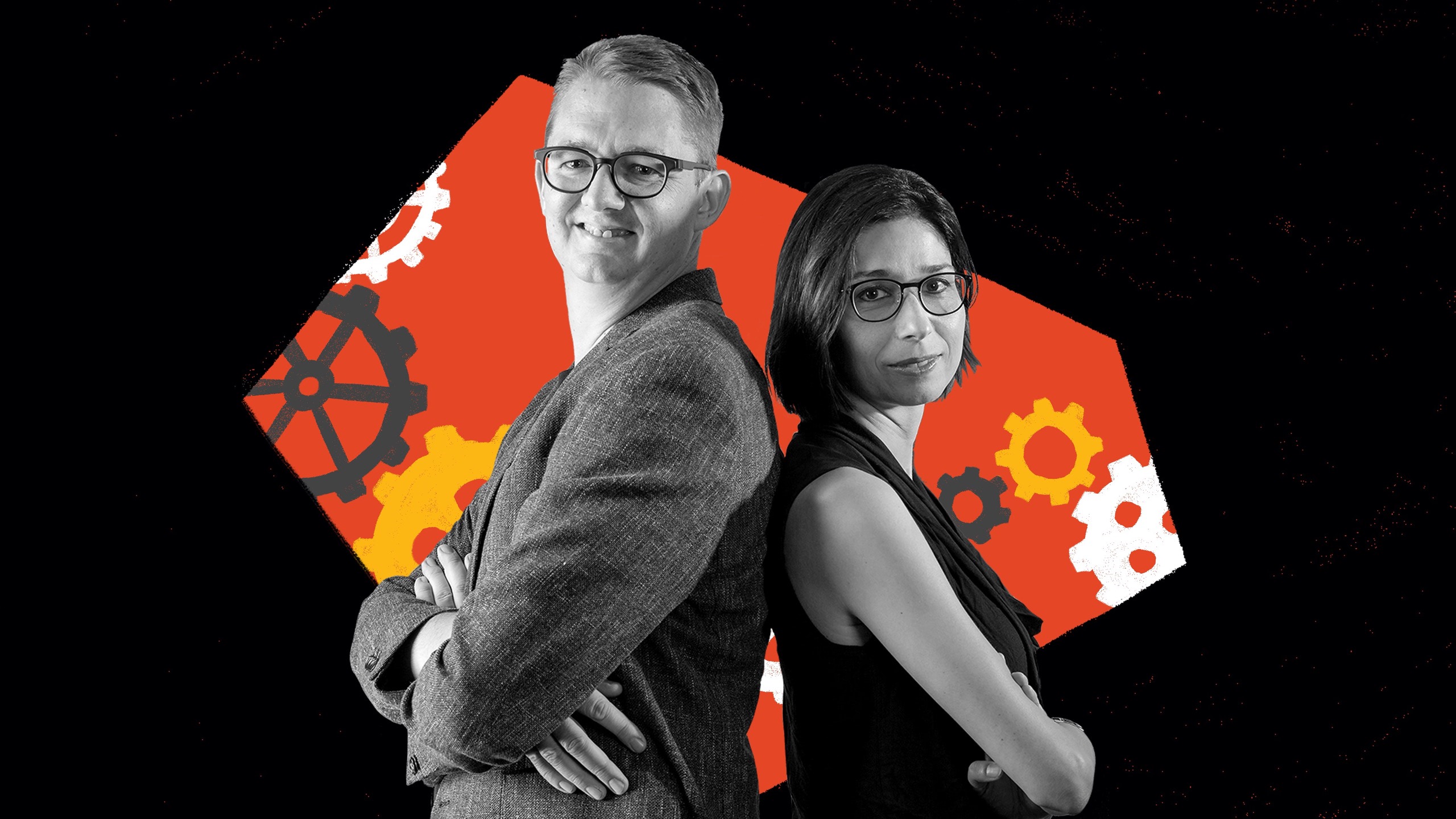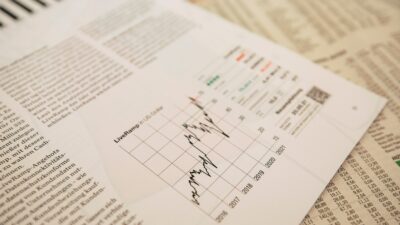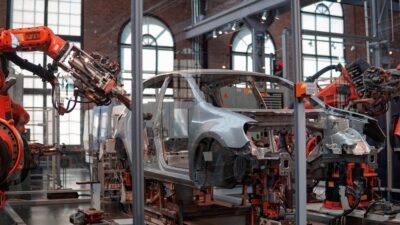Sandra Peter and Kai Riemer

The future of work not as usual on The Future, This Week
This week: working less for more, and the future of work not as usual. Sandra Peter (Sydney Business Insights) and Kai Riemer (Digital Disruption Research Group) meet once a week to put their own spin on news that is impacting the future of business in The Future, This Week.
The stories this week
04:50 Experimenting with the 4-day work week
12:18 What’s missing from the future of work debate
Other stories we bring up
Nike’s decision to stop selling merchandise to Amazon
Condé Nast’s CEO still isn’t sure about the impact of Apple News Plus
Why the world is running out of sand
We’d better be ready to rethink the meaning of work, because things are changing fast
What if you had a four-day week?
Microsoft tried a 4-day workweek in Japan
When your boss is an algorithm (1)
When your boss is an algorithm (2)
Our previous conversations about the four day work week and #996 culture
Our previous conversation on robolawyers
Our previous conversation on Uber drivers ‘secretly colluding’ to cause price surges
The Uber study by researchers Mareike Möhlmann and Ola Henfridsson, from Warwick Business School, and Lior Zalmanson
Our previous conversation on gig platforms’ claims over worker chat groups
Our discussion of Kickstarter and the automation paradox
Hospital software tells doctors of their ‘deficiencies’
You can subscribe to this podcast on iTunes, Spotify, Soundcloud, Stitcher, Libsyn, YouTube or wherever you get your podcasts. You can follow us online on Flipboard, Twitter, or sbi.sydney.edu.au.
Our theme music was composed and played by Linsey Pollak.
Send us your news ideas to sbi@sydney.edu.au.
Dr Sandra Peter is the Director of Sydney Executive Plus at the University of Sydney Business School. Her research and practice focuses on engaging with the future in productive ways, and the impact of emerging technologies on business and society.
Kai Riemer is Professor of Information Technology and Organisation, and Director of Sydney Executive Plus at the University of Sydney Business School. Kai's research interest is in Disruptive Technologies, Enterprise Social Media, Virtual Work, Collaborative Technologies and the Philosophy of Technology.
Share
We believe in open and honest access to knowledge. We use a Creative Commons Attribution NoDerivatives licence for our articles and podcasts, so you can republish them for free, online or in print.
Transcript
This transcript is the product of an artificial intelligence - human collaboration. Any mistakes are the human's fault. (Just saying. Accurately yours, AI)
Disclaimer We'd like to advise that the following program may contain real news, occasional philosophy and ideas that may offend some listeners.
Intro This is The Future, This week on Sydney Business Insights. I'm Sandra Peter, and I'm Kai Riemer. Every week we get together and look at the news of the week. We discuss technology, the future of business, the weird and the wonderful, and things that change the world. Okay, let's start. Let's start!
Sandra Today on The Future, This week: working less for more, and the future of work not as usual. I'm Sandra Peter, I'm the Director of Sydney Business Insights.
Kai I'm Kai Riemer, professor at the Business School and leader of the Digital Disruption Research Group.
Kai So what are we doing?
Sandra I've seen a lot of interesting stories about companies considering whether or not they want to stay with big tech. Nike, for instance, is getting off Amazon to sell directly to the customer, and there was another article where Condé Nast is trying to figure out whether Apple News is really working for them.
Kai And we know that New York Times have not signed up to Apple News as well. So I think these are all stories that showed that if your brand is big enough, you can resist the power of big tech to own the customer relationship.
Sandra There was another interesting headline that told us that the world is seemingly running out of sand.
Kai Yeah. So that ties in with the bigger climate change resource security story. And it is incidentally, also one about Australian ingenuity because apparently we're selling a lot of sand to desert countries.
Sandra I think we should keep this one and come back to it because, you know, 'the world's running out of sand' is a good story.
Kai And the background is, of course, that it's used in concrete and it needs a particular sand that's coming from under the water not sand shaped by winds so desert sand can't be used in construction, but apparently we're using so much that we're running out. So that's no good.
Sandra But we've seen a lot of stories this week about work. There was one in Forbes telling us that we'd better be ready to rethink the meaning of work 'cause things are changing really fast. And there was the one in Inc. that was suggesting that companies are wrong about the eight hour work day.
Kai There's one from the Brookings Institute that has been picked up in other outlets, that makes a valid point. In the future of work, what we forget often is the workers themselves and their perspective. So it's often a very abstract discussion.
Sandra But, you know, the interesting thing about all of these stories is that it seems to be the future of work not as usual. All these stories are actually about the future of work.
Kai But they're not like we normally discuss the future of work. Like there's a lot of these stories, automation from AI, and robots will displace workers and lead to job losses, and famously there's the 47 percent that is being bandied about in every other news article.
Sandra Yep, that based on the famous Oxford Frey and Osborne's paper from 2013 that really found that 47 percent of occupation were at high-risk of being automated, and that's been picked up over and over again.
Kai Yeah, we've done this before, right? Yeah, yeah, and this has been rightly criticised for its methodology that it focuses on entire jobs, and actually, you know, the main point is that it's been misappropriated in the media as well.
Sandra But that hasn't really stopped the media for the past few years, talking about the robo-apocalypse, talking about robots coming for our jobs. They're talking about large numbers of workers being displaced, alongside the other big narrative, the hype narrative that we've also discussed at length, where technology will solve everything from inequality to climate change to cancer. We'll all be better off.
Kai Yeah, and then that could be the comeback, which says, you know, 'sure, there's going to be jobs lost. But every new wave of technology also creates new jobs that we can't foresee yet'. But the point is, it's a completely quantitative argument, right? Jobs lost, jobs gained, maybe, you know, not, not enough skills of this kind, so you need to retrain workers into other jobs. So it's always at that level.
Sandra But if you look at these two stories this week, they're really about the future of work not as usual. So talking about four-day work weeks and talking about worker voices. So how about we do a special today and just try to look at the future of work, but not as usual?
Kai Yeah, not how much work there is and how many jobs, but what does it actually mean for work itself? How is work itself changing qualitatively? All right, then, Sandra, what happened in the future this week?
Sandra Our first story comes from Inc., and it's titled: "Research Suggest Companies Are Wrong about the 8-Hour Workday. Here's How to Prepare for Flexible Schedules". The story reports on Microsoft Japan, and Microsoft Japan recently announced the results of its four-day work week experiment. They had over 2,000 employees who got to take every Friday off. The program was called Work Life Choice Challenge. And what Microsoft did was to shut down its offices every Friday in August and give everyone an extra day off each week. Turns out there was a 40 percent increase in productivity, 40 percent, not to mention that of course, the company saved on other things, things like electricity by shutting down for one day a week. And the initiative was started in Japan, especially in the context of the culture of overwork that you have in Japan. We've discussed this previously on this podcast when we discussed hashtag 996. So the idea of working from 9 to 9, 6 days a week in China and this being a widespread practices, especially at tech companies.
Kai But in the example of Microsoft, the way in which they suggested to workers to compensate for the reduced working hours is to actually spend less time on emails and less time in meetings. So for them, the reduction in total work hours or workdays in the week was a chance to rethink some of the things that we know are not necessarily driving productivity in the workplace, which is email and meetings. So at the same time, a wake-up call to think about the way in which you work and the quality of the work that you do.
Sandra And Microsoft will conduct another experiment in Japan later in this year. They're also asking some other companies to join and they're asking workers themselves to join in and tried to come up with new ideas to improve work life balance or to improve work efficiency in those four days.
Kai And while it's interesting to see that some companies are actually embarking on real life experiments and there've been others, a New Zealand law firm a little while back went to a 30 hour work week that was reported in The New York Times, which turned out to work quite well. We also know from research that there's a strong correlation between working less hours and performance. So a study in the American Journal of Epidemiology found that those who work 55 hours per week performed worse on certain mental tasks than those who worked 40 hours a week. In another study at Florida State universities into top performers in sports, entertainment and chess discovered that those who were the best performers normally practiced in very short, uninterrupted sessions, meaning that short bursts of really concentrated works usually leads to better performance than just spending hours and hours doing what you do. And these were reported in another article in VOX that we're going to put in the show notes.
Sandra So the question then is and it was actually the title of The New York Times article, "What if You Had a Four-Day Work Week, Why Don't You?" The question is, if we're seeing these gains in productivity and if we know there is research that says that we might be better off working four days a week, why don't we go to this? And there's been really a long tradition of people predicting the four-day work week or even less. John Maynard Keynes famously predicted that by 2030, which is not that far off now, we would all be working 15 hours a week. Nixon famously predicted that we would work less, businesses and governments have really been experimenting with this for quite a few years now. But still, why is it taking so long?
Kai ] Yeah, and looking at our own workloads here, it's not 15 hours a week, right? So I think inertia, so that's one thing. The fact that it's pretty much ingrained in the culture that working long hours seem to be a sign of vigour. It's a good thing to do. And there's also certain professions where you're basically being paid to deliver a job. So many professional service firms, consultancies, they work at the client sites or leaving early would be seen to be not professional. So there's certain incentives in the system that incentivize spending long hours at work, which would have to be done away with.
Sandra So some of these barriers are indeed corporate or institutional barriers. You can't have one company and the other companies not moving. There is also all the stuff that goes around work, children going to school and needing to be picked up and so on and so forth. Some aspects are really cultural as we've discussed before, 996 and this pride in working long hours and then being busy for very long time.
Kai But how have we done it previously? Because people invented the six-day work week and then we invented the weekend, right? So we ended up in this place of 40 hours and five days, which seems to have stuck around for a long time, so if we've done it previously, what was different then?
Sandra Well, previously and by previously we mean 100 years ago. Previously we've done it through companies, actual individual companies making the move, not the government mandating things. And what's often cited as the first example, and it's mentioned in The New York Times article as well, a New England mill that expanded the one day weekend that used to be the Sunday, the one day weekend to two days to accommodate its Jewish workers. So the Saturday, the Sabbath was going to be a free day as well. So now we had the week-end. And about twenty years later, Ford famously followed suit and instituted the five-day work week for the entire Ford Motor Corporation and then popularized the idea, which was then taken up by a number of other companies.
Kai Yes. So was Ford in a position to do this because they were just massively big? We've discussed previously, right? The big companies like the big stock market companies, the tech companies, they're big in dollar value, but they're not actually big in the number of people that they employ. So if any one of those did this, it might have a signalling effect, but it wouldn't have that much in effect on the number of people who work.
Sandra Well you would need someone like Walmart to do it with, I think it's over two million employees that would send a strong signal. And I think there are a number of other cases where industries that employ a large number of people are making the change. Shake Shack in the US, for instance, if you think about restaurants and fast food trying out the four-day work week in some of its stores, and that there is a significant change because if you're making shake some burgers, it's not like you can reduce the time you spend on your e-mails or you can reduce your meeting time. So it is the company itself that has to introduce that kind of flexibility and really fundamentally change the way they think about working hours. But let's not lose sight of why we're looking at the stories. We decided to look at these stories because they were an interesting, different way to think about the future of work.
Kai Because they're about the quality of work and the reconfiguring of work itself, not just an argument about jobs lost, jobs gained, but really to look at what does it actually mean for doing work and for the people involved, which brings us to our second story, which comes from Brookings.com. This is the outlet of the Brookings Institute.
Sandra So the Brookings Institution is a non-profit...
Kai Did I say it wrong?
Sandra No, you're always right. So the Brookings Institution is a non-profit public policy organisation. They're out of Washington, DC, and what they do is they try to conduct in-depth research that leads to new ideas or ways to solve problems that society is facing, not only at the local level, but more national and global issues. They work with hundreds of researchers from around the world. And in the case of this article, it's actually a Stanford study that they're reporting on.
Kai So the article makes the point that in the conversations around the future of work, the voice of the people most affected, the workers, is never actually heard. And that has two dimensions. One is whose voice is being represented in these discussions and what is the role of the workers in the discussions about the future of work. So on the one hand, the article makes the point that oftentimes we very narrowly have this image of the white male office worker or blue collar worker being displaced, other groups such as women or minorities, that often the most vulnerable under this automation argument are not really included in the discussions. But that's not the part of the argument that we want to highlight. The other one is the point that workers actually lack agency in shaping the direction of these automation technologies and how it shapes the work in ways in which technologies complement humans in the workplace.
Sandra And this takes us back actually to why we pick these two stories for today, because as we mentioned in the beginning, the future of work is most often discussed in quantitative terms. The number of jobs that will be disappearing, the number of tasks that will be replaced, the types of industries that will be affected. These two stories highlighted a qualitative side to the argument. What will work be like? Who will have a say in this? But it turns out, even in this conversation, the best case scenario we talk about augmentation, about how the lives of these workers will be different when you add technology in the mix. And we talk about augmenting their work with that technology.
Kai Yep, but augmentation of the picture that we often have is that rather than, say, displacing the doctor with the algorithm that can diagnose diseases, we say, 'oh, but wouldn't it be better if the doctor had this technology as a tool?' And the two together augmented would do a much better job and provide much better care for patients. And yes, we might ultimately need a few less doctors, but the idea is that we get this better outcome, better quality. But what we're forgetting here is that this augmentation also has a dark side. We want to remind you and highlight a few stories that we've done previously that point to changes in work practices that affect the quality of work itself and the way in which work is experienced.
Sandra Two months ago, we discussed a story by the vice president of Kickstarter who was talking about how as the company grew, they had to automate the approval of the projects that were submitted for crowdfunding on Kickstarter. And whilst in the beginning one was people reviewing all the projects. There were easy wins. There were these cases where people just achieved their goal really, really quickly, managed to raise ten times as much money as they had wanted and people had the sense of achievement. Now, the algorithm was actually taking care of all the easy wins and the employees were left with the really difficult cases, the ones that had smaller chances of success or where they were unsure whether they complied with Kickstarter's terms and services. So there was a lot of uncertainty, a lot of complexity and a lot of dissatisfaction around working on these cases.
Kai And while this complies with the general narrative that, you know, when we automate parts of the work and the humans can concentrate on the more complex cases, it also turns out that those complex cases are more stressful and they're much less enjoyable. And so the work satisfaction and the quality of work and workplaces actually deteriorated off the back of the automation.
Sandra And of course, you could make this argument similarly for call centres and a lot of other industries where you would get the exact same results.
Kai So this automation of quick wins in this case had negative outcomes. In the second story we want to highlight is that of Uber and other business models and work practices where an algorithm organises the work of a group of people.
Sandra We discuss this on the podcast more than two years ago and there was a story about Uber drivers secretly colluding to cause price surges so they will discuss on WhatsApp to go to an area. They would all turn their Uber apps off, wait for the price surge and then turn it on and take advantage of that price surge. And there was research we discussed at that time that was looking up how the drivers behaviour was actually a response to being managed by an algorithm to having no agency over their work.
Kai Yes. And to be exposed to an environment of surveillance, which can be immensely stressful. And we've seen a couple of more articles in both the Financial Times and The New York Times, both with the same title, "When an Algorithm Is Your Boss", which have discussed what it feels like and is like when humans are being subjected to these algorithms that make decisions about what they can and can't do.
Sandra A third story we could tell here is one that came up a couple of weeks ago talking about doctors experience with a new patient's record system software. This was reported in The New York Times and it reported on how the software actually amplified the insecurities that come with being a doctor as the system was constantly reminding the doctors about their deficiencies, things that they hadn't filled out, or data that they hadn't provided the cases or checkboxes that weren't worked out.
Kai And the interesting thing here is that we're often told that the automation of the routine and admin aspects of certain jobs, such as in education, in the creative industries and indeed in the health and medical professions, will free up those professionals to actually focus on their core skills, on their creative work, on their diagnostic work. What we see here is that a lot of the time, because of the way in which these systems formalise work as a set of discrete tasks actually reduce the degrees of freedom and create certain instances where only certain ways of performing a task are allowed. And they're also very hungry for data. So people end up being governed by these systems rather than being freed up to be the professionals that they're supposed to be.
Sandra So rather than things happening on the doctor's terms, the experiences had in the products voice, so to speak.
Kai Yeah. So it's on the system's terms, not on the doctor's terms. And this leads us straight to a fourth point, which is that a lot of the time the automation of back office processes creates more busy work, hidden work where the system requires data inputs or where certain routine tasks are automated. But anything that sort of falls only slightly outside of the norm will create more work than previously before automation had been brought in.
Sandra And there there's also one last story we wanted to highlight and that again has to do with the quality of work that results when we think about automation and augmentation and we've discussed this on the podcast about two and a half years ago, when we talked about the legal industry being quite slow to adopt technology, but there being forays into the legal industry through automating discovery or documents reviewed the types of tasks that junior associates would do in a law firm.
Kai And while in isolation, you might look at this work and say this is a bit shit because it's just repetitive and it's tedious, and wouldn't it be a great idea to use algorithms to sift through this data and automate this? It comes at a cost.
Sandra And yes, it absolutely is a good thing to automate this sort of work. But the cost is actually quite high as those junior lawyers would sit on larger teams with more experienced lawyers, and this would form part of their apprenticeship into the profession. So they would gain expertise by being around on big projects and doing this kind of work. Those pathways to the profession are now being radically challenged through automation.
Kai And this points to a general argument where expertise is acquired, in any case, in a stage wise process where you engage in more routine work and then more complex work and then you build up your judgment expertise to then at some point become an expert in your field. If we automate a way that lower end of tasks and people can't engage in these tasks, we actually foreclose certain established pathways by which people learn their way into the higher value tasks that are now being left after automation. So in other words, you need to learn to drive a car in the first place to then become a race car driver.
Sandra So in the end, maybe what we need is a different conversation about the future of work. Rather than having discussions about the types of tasks and the types of jobs that will be automated and their number, which will only lead you to a conversation about the future of work and ways in which you need to reskill workers having a much more nuanced conversation around the quality of work, which then can lead you to...
Kai Conversations around work design, work satisfaction, and including the people who are affected by changes to work through automation in the conversation to actually shape workplaces in which people want to work. And that work from, say, a skills progression point of view and that allow professionals to be professionals rather than be governed by algorithms, which comes at the expense of the quality of work in the end.
Sandra And what's more, it also allows you to open up all the other conversations about work that have to do with reimagining safety nets for workers or the ways in which workers can organise, or how to best think about structuring how and when work happens to begin with.
Kai And here's a title for a paper someone could write, "Augmented by bots, reframing the automation and future of work debate around quality".
Sandra And that's all we have time for today.
Kai See you soon...
Sandra On The Future...
Kai Next week.
Sandra This week?
Kai Yes. But next week.
Sandra On The Future, This week. Next week. Thanks for listening.
Kai Thanks for listening.
Outro This was The Future, This Week, made possible by the Sydney Business Insights Team and members of the Digital Disruption Research Group. And every week right here with us, our Sound editor Megan Wedge who makes us sound good and keeps us honest. Our theme music was composed and played live on a set of garden hoses by Linsey Pollak. You can subscribe to this podcast on iTunes, Stitcher, Spotify, YouTube, SoundCloud or wherever you got your podcasts. You can follow us online on Flipboard, Twitter or sbi.sydney.edu.au. If you have any news that you want us to discuss, please send them to sbi@sydney.edu.au.
Close transcript







